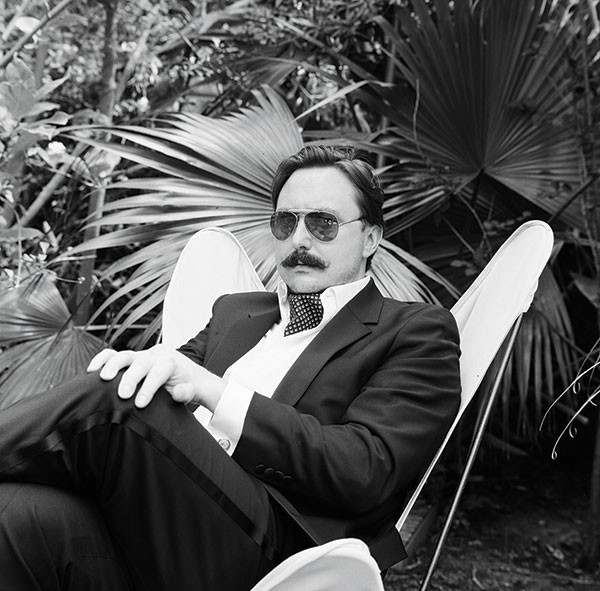Known as a correspondent on The Daily Show With Jon Stewart, and for his best-selling books of fake trivia, John Hodgman is something of a Renaissance man. This week, the professorial humorist — who recently starred in his own apocalypse-themed comedy special, Ragnarok — pauses from writing Ayn Rand parodies for The New Yorker and settling squabbles on his podcast, Judge John Hodgman, to play the Rex Theater.
What's your show like?
Ragnarok did not mark the end of the world as I had predicted it. But it, in many ways ended my world, in so far as I had a solid 50 minutes of apocalyptic Mayan material which would not make any sense after 2012, and I'd made very few plans for what I would do after that material was, by necessity, retired. I started essentially from scratch in January, performing unadvertised shows, just learning to tell stories and tell jokes. And consequently, I realized I had more to say to the world.
In the face of losing your material, how much were you hoping the world would end?
I care for other humans, I'm not a monster. I guess I always secretly hoped that the world wouldn't end, but I turned 42 this year, and that's around the time that people start dreaming about apocalypse. The consolation of apocalypse is that life is has a dramatic and consequential ending instead of the slow dwindling of a life of irrelevance that is so terrifying to anyone, but especially to a creative person.
I guess there was a part of me that hoped the world would end because I've accomplished essentially everything — I don't mean this in a braggy way — everything that I wanted to accomplish creatively in my life, [and] so much more than I could have imagined hoping to accomplish. By the time the books were done, and Ragnarok was over, and the world didn't end, it was time to take big stock of "Well, now what do I do?" A lot of this new show was born of me trying to figure out what to do next.
Your performance style has grown more casual; you'll now wear jeans onstage instead of suits.
It's a sad statement on my wardrobe that wearing jeans is a radical change for me, especially since the jeans that I'm wearing are jeans that I got for free in the gifting lounge when I worked the Emmys, three or four years ago. [They're] getting a little old and stinky. They're a little out of style. But I still wear 'em. I've spent a good period of my career pretending to be an expert in fake history and fake trivia, pretending to be so many different things. While [these were] authentic reflections of me, the only thing left, after the world did not end, was to stop hiding behind tuxedos, and funny sunglasses and ridiculous comedy mustaches, and try — such as it may — to be myself. Though the comedy mustache is still there; I can't tell if that's because I actually am a weird guy with a mustache, or [because] I'm afraid if I try to shave it, it will spit acid like the face-hugger in Alien.
You've written three books of fake trivia and history. When the real world seems increasingly ridiculous, is there still a place for fake facts?
I can't compete with the Internet. The Internet has done a really good job of generating fake facts and misinformation at an astonishing rate. And the sense of authority that was already eroding when I wrote the first book, The Areas of My Expertise — as cable news and other venues tried to fill up space with content, so that anyone who wanted to be an expert could just automatically call themselves an expert — is now so eroded that I don't think anyone believes in it anymore. I would have continued to write fake facts and fake history because it's part of my DNA to think in those terms. But I wrote almost a thousand pages of complete world knowledge. To me that particular project is over. And while I might say that sincerity might be the new phoniness in my act, such as it is, people should be aware that I'm not totally sincere.
You settle a lot of disputes on Judge John Hodgman. Have you always been an advice-giver?
My good friend [musician] Jonathan Colton, who I've known since I was 18 years old — I've always been an advice-giver, almost exclusively to him. I'd tell him what to do with his career, I'd tell him to quit his job and start singing songs for nerds. And sometimes he would say yes and sometimes he would say no, and sometimes I could tell that he wanted me to just stop it.
I love telling people what to do with their lives because it's so much easier than figuring out what to do with my own life.
Have you ever regretting a ruling?
The one that haunts me still, it goes back really early. It was a feud between a young woman and her male friend. He had a food truck in Portland called Amazing Cone. And the idea was to serve food in waffle cones. Not ice cream, but entrée-style food, like chicken curry in a waffle cone. He hired her and provided space in his basement for her to create an awning for his food truck. He ended up not paying her all of the money he promised. [As evidence,] he had taken a lot of pictures of himself in his basement with his gigantic Portland facial hair, riding a 1970s-era stationary bicycle, as if so show that this basement where he imprisoned his friend was a fun place to be. All I could see was, "This guy from Portland is making a joke of my Internet courtroom. This is all hipster irony!" I got pretty serious with him, and I sentenced them to have at least one non-ironic hug, as well as paying her the money she was owed. Portland may be in Oregon, but it's also in the United States. We're not a barter economy.
I really felt that they were both offended. And every effort that I made online to reach out to them was just was met with stony silence. For a while I thought, "I should really be a little more sensitive in my rulings." And there was a long period of me being very sensitive. I've now reversed the course and I'm getting harder again.
Well, it is your courtroom.
Yeah, I can't be worried about these people's feelings. They're here to be judged.















